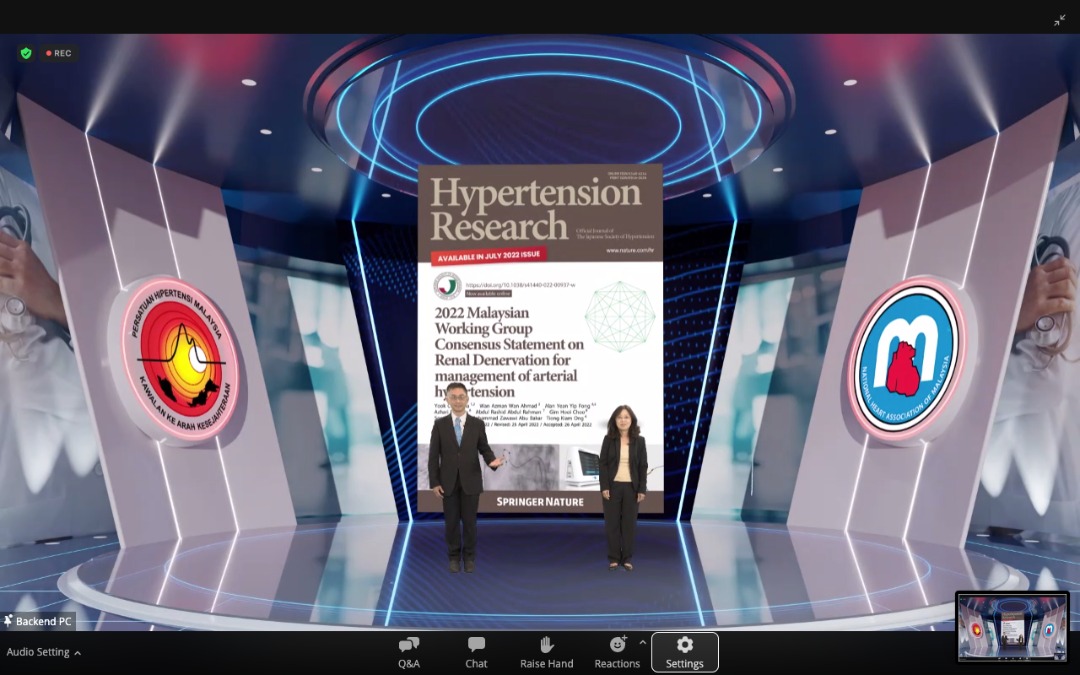KUALA LUMPUR, June 7 – The consensus paper on renal denervation developed by the Malaysian Renal Nerve Denervation Working Group (MyRDN), a collaboration between the Malaysian Society of Hypertension and the National Heart Association of Malaysia, has been accepted for publication in the specialised Hypertension Research medical journal.
The paper, which provides recommendations and guidelines for health care professionals on the use of renal denervation in the treatment of people with hypertension, was peer-reviewed by industry professionals and has been published in the journal for health care professionals and is now accessible to the public.
Dr Alan Fong, president of the National Heart Association of Malaysia (NHAM), said: “We are proud that our consensus paper, which was wholly produced by Malaysian specialists, has been published by the Hypertension Research journal, which is the official journal of the Japanese Society of Hypertension. This journal publishes high quality original research specifically in the area of hypertension, or high blood pressure, and other related heart diseases.”
The consensus paper will also be available as an open access document on the Hypertension Research journal website for health care professionals and the public to reference.
Prof Dr Chia Yook Chin, co-chair of MyRDN and past president of the Malaysian Society of Hypertension, said: “It is important that both the health care professionals and members of the public have access to these recommendations and guidelines for the use of renal denervation. The doctors and patients can discuss the suitability of this procedure on an individual basis and come to a decision together. This is particularly important as the consensus paper states that patient preference is one of the considerations in the decision to proceed with this procedure.”
Renal denervation is a minimally-invasive procedure where radio frequency waves are targeted at the renal (kidney) sympathetic nerves in order to reduce their activities, which contributes to hypertension.
Among the types of patients recommended to undergo this procedure are those with resistant hypertension; those whose blood pressure still remains high despite being on the best combination of anti-hypertensive medications; those who consistently don’t take their medications regularly despite counseling, and those unwilling to be on long-term medication.
Dr Fong noted that a study done in Sarawak found that around one in four patients involved in the research who were suspected of having resistant hypertension, did indeed have resistant hypertension.
From there, the researchers (of whom Dr Fong was one) estimated that around 200,000 Malaysian adults had true resistant hypertension in 2021, based on national data.
The study, which has been submitted to the NHAM Congress 2022, was conducted with the aim of filling in the gap in data surrounding the prevalence and epidemiology of true resistant hypertension in Malaysia.
“It is important to have more accurate numbers related to resistant hypertension in Malaysia as patients with this form of hypertension face an even higher risk of heart and kidney disease than those with regular hypertension. Patients with resistant hypertension have the option of undergoing renal denervation as an adjunct treatment to help them lower their blood pressure, and thus, also decrease their risk of serious heart and kidney issues,” said Dr Fong.
According to data from the first 80 patients involved in the ongoing SPYRAL HTN-ON MED clinical trial, those with uncontrolled hypertension despite being on anti-hypertensive medications, experienced an 18.7 mmHg decrease in systolic blood pressure as measured continuously over 24 hours via ambulatory monitoring, and a 20.9 mmHg decrease when measured in the office, three years after undergoing the procedure.
In comparison, patients who underwent a sham procedure (i.e. a renal angiogram, rather than renal denervation) experienced an 8.6 mmHg decrease in systolic blood pressure as measured continuously over 24 hours via ambulatory monitoring, and a 12.5 mmHg decrease when measured in the office.
The trial also demonstrated that the use of the Symplicity Spyral renal denervation catheter, which is produced by Medtronic, to be safe in the long run, with no major device or procedural adverse events occurring throughout the three years under analysis.
Dr Fong and Prof Dr Chia were part of the panel discussing the consensus paper, renal denervation and resistant hypertension in Malaysia at the official launch of the consensus paper on renal denervation, hosted by Medtronic.
They were joined on the panel by MyRDN co-chair Dr Ong Tiong Kiam, National Heart Institute (IJN) senior consultant cardiologist Dr Azhari Rosman, and NHAM past president Prof Dr Wan Azman Wan Ahmad.








